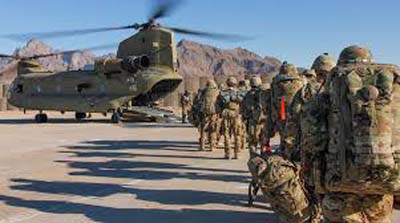
Early withdrawal of US forces from Afghanistan could be dangerous
Zahid Hussain
President Trump’s decision to pull out residual American troops from Afghanistan by end of year may have pleased the Taliban, but not the Afghan government and regional countries. There is a worry that a complete withdrawal of US troops before the Afghan government and Taliban agree on a viable political setup could leave a dangerous vacuum of power in the war-ravaged country.
In a surprise move, less than four weeks before the US presidential election, President Trump announced that the remaining number of US troops serving in Afghanistan would be back home by Christmas. Earlier, US National Security Adviser Robert O’Brien had stated that American forces in Afghanistan would be halved to 2,500 by early 2021. The president’s statement has added to the confusion in US policy.
At present, the number of US troops stands at 4,800. Some observers believe that President Trump’s decision for a faster pullout is aimed at bolstering his re-election prospects. Under the February peace agreement between the US and Taliban, the withdrawal of US troops was to be completed in 18 months contingent upon the success of intra Afghan talks.
President Trump’s announcement could not be more untimely as the Afghan government is engaged in critical negotiations with the Taliban. Some observers believe that the decision could have an adverse impact on the talks. While predictably the Taliban have welcomed the early withdrawal of US troops, the Afghan government has expressed its disappointment.
Islamabad’s major concern is that the pulling out of all foreign troops without an interim political set up in place could plunge Afghanistan into a new round of civil war that could have a direct bearing on Pakistan.
The Taliban took no time to hail President Trump’s announcement. Zabihullah Mujahid the chief Taliban spokesman declared the move a “very positive step in the implementation of the agreement between the Islamic Emirate and the United States.” To many analysts, the move will weaken the Afghan government’s position.
Direct talks between the Taliban and Afghan government started in September after a long delay. One month on, the talks have not made any breakthrough. Shrouded in secrecy, rival delegates are trying to set a framework for a structured dialogue on a future political setup. The Kabul government blamed the Taliban for being inflexible.
One major reason for the stalemate in talks is the Taliban’s reluctance to agree to a cease-fire. Last month the Afghan government’s chief negotiator Dr. Abdullah Abdullah visited Islamabad in order to seek Pakistan’s support in getting the Taliban to agree on a reduction in violence. But there has not been any positive response from the Taliban yet.
After the February peace agreement, the Taliban had stopped attacking American forces, but there has been a marked escalation in the insurgent offensive against Afghan security forces.
The spike in the violence seems to be part of the Taliban strategy to expand areas under its control and use it as leverage in talks with the Afghan government. There is some indication that the Taliban might agree on a reduction of violence only after some progress is made in intra Afghan talks.
Many observers believe that President Trump’s decision to accelerate troop withdrawal could take off pressure on the Taliban to show some flexibility in the intra-Afghan dialogue. The Taliban have not yet revealed their concept of a future political setup in Afghanistan. The insurgents have said that they are committed to a pluralistic system of government but there is no indication yet on whether they will take part in the elections.
President Trump’s decision of an early withdrawal of US troops will not go down well with neighboring countries. Earlier this year, Pakistan, Afghanistan and China had warned the US against a precipitous withdrawal of its troops from Afghanistan, saying terrorist groups could take advantage of it.
A joint communiqué issued at the end of the trilateral meeting had said: “The three sides urged for an orderly, responsible and condition-based withdrawal of foreign troops from Afghanistan to avoid a potential terrorist resurgence.”
Pakistan’s prime minister Imran Khan had also warned the Trump administration against a premature withdrawal from Afghanistan. Islamabad’s major concern is that the pulling out of all foreign troops without an interim political set up in place could plunge Afghanistan into a new round of civil war that could have a direct bearing on Pakistan. Many hope that the decision of a fast withdrawal of US troops will be reversed if Joe Biden wins the presidential race.
However, there will not be any change in the overall Afghan policy under a democratic party dispensation.
The writer is an award-winning journalist and author. He is a former scholar at Woodrow Wilson International Centre for Scholar, USA, and a visiting fellow at Wolfson College, University of Cambridge, and at the Stimson Center in Washington DC.
